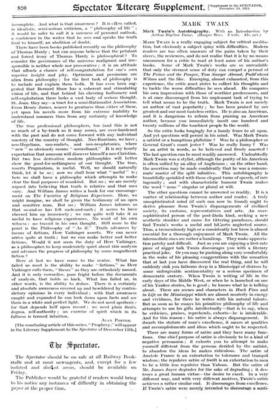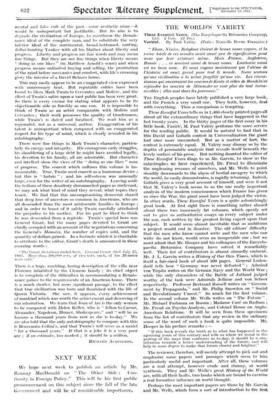MARK TWAIN
Mark Twain's Autobiography. With an Introduction by Arthur Bigelow Paine. (Harper Bros. 2 vols. 42s. net.)
- MARK TWAIN is a really engaging subject for critical medita- tion, but obviously a subject spiny with difficulties. Modem readers are too often unaware of the pains taken by their slaves, the reviewers, and do not realize that it is by no means uncommon for a critic to read at least some of his author's books. Some of Mark Twain's works are so unreadable that only the sternest sense of duty can compel a perusal of The Prince and 'the Pauper, -Tom Sawyer Abroad, Pndd'nhead Wilson and the like. Emerging, almost exhausted, from this experience, the critic.must strive to collect his thoughts and to tackle the worse difficulties he sees ahead. . He compares his own impressions with those of worthier predecessors, and is at once discouraged from his unpleasant task of trying to tell what seems to be the truth. Mark Twain is not merely an author of vast popularity ; he has been praised by our greatest and our most tasteless critics. He is also an American, and it is dangerous to refrain from praising an American author, because you immediately insult one hundred and twenty millions of the touchiest people tn, the world.
So the critic looks longingly for a bandy fence to sit upon. And yet questions will persist in his mind. Was Mark Twain a satirist or a bumptious philistine ? Was he a philosopher or General Grant's court jester ? Was he really funny ? Was he an artist in words, as he believed and firmly asserted ? The last question can be most readily answered. Undoubtedly Mark Twain was a stylist, although the purity of his American is often sullied by an alloy of Anglicisms ; on the other hand, the assertion may be made confidently that he was a consum- mate* master of' the split infinitive. This autobiography is beautifully sprinkled with those elegant turns of speech, of rare ingenuity ; and with characteristic humour Twain makes the word " none " singular or plural at will.
The other questions cannot be answered so readily. It is a matter of relationship between author and reader. A truly unsophisticated mind (if such can now be found) ought to derive pleasure from Twain's disparagements of civilized society, its customs, representatives and arts. An over- sophisticated person of the post-Dada kind, seeking a new aesthetic shudder and cause for tittering paradoxes, should find Twain's works a useful and hitflerto neglected source. Thus, a tremendously high or a consistently low brow is almost essential for a thorough enjoyment of Mark Twain. All the intermediate sizes are rather a handicap. They make apprecia- tion patchy and difficult. Just as you are enjoying a first-rate piece of nigger talk Twain discourages you with a literary practical joke. Or you may be pushing along very comfortably in the wake of his pleasing exaggerations with the sensation that at last you have discovered the real thing, and he will suddenly sink you fathoms deep in a Mississippi of distress by some unforgivable sentimentality or a serious specimen of democratic oratory. When Twain is writing of life in the early days of the Middle West, or when he is launched on one of his Yankee stories, he is good ; he knows what he is talking about. There are scenes and characters in Huck Finn and in Life on the Mississippi which are almost masterly in energy and vividness, for there he writes with his natural talents. But as soon as he essays his primitive philosophy of life and attempts to use his gifts intellectually—that is to say, when he criticizes, praises, reprehends, exhorts—he is intolerable. And for this reason : his satire is always disparagement, ' It dwarfs the stature of man's excellence, it sneers at qualities and accomplishments and ideas which ought to be respected.
There are many forms of satire and they have many func- tions. One chief purpose of satire is obviously to be a kind of negative persuasion ; it exhorts you to attempt to make yourself different from the persons derided by the satirist, to abandon the ideas he makes ridiculous. The satire of Anatole France is an exhortation to tolerance and tranquil wisdom ; the repulsive satire of Swift is an exhortation to men to be a little less repulsive than Yahoos. But the satire of Mr. James Joyce degrades for the sake of degrading ; it des- troys a great human virtue—the desire to excel. In a very different way, and with. very different motives, Twain's satire achieves a rather similar end. It discourages from excellence. If Twain's satire were merely intended to discourage a senti-
mental and false cult of the past—some aesthetic craze—it would be unimportant but justifiable. But its aim is to degrade the civilization of Europe, to overthrow the Renais- sance ideal of the complete man, and to substitute the very inferior ideal of the sentimental, broad-bottomed, ranting, dollar-hunting Yankee with all his blather about liberty and progress. Liberty and progress are fine words and may mean fine things. But they are not fine things when liberty means doing as one likes " (in Matthew Arnold's sense) and when progress means unlimited buying and selling, the prostration of the mind before.meci.anies and comfort, with life's crowning glory the interior of a David Belasco home.
This may easily appear to be an exaggerated view expressed with unnecessary heat. But reputable critics have been found to liken Mark Twain to Cervantes and Moliere, and the effect of Twain's satire upon a vast public has been very great.
So there is every excuse for stating what appears to be its objectionable side as forcibly as one can. It is impossible to think of Twain as an artist comparable with Moliere and Cervantes ; their work possesses the quality of timelessness, while Twain's is dated and localized. We read him as a regionalist, not as a universal, author. Exaggeration of his talent is unimportant when compared with an exaggerated respect for his type of mind, which is clearly revealed in his autobiography.
There were fine things in Mark Twain's character, particu- larly its energy and integrity. His courageous early struggles, his shouldering of a large debt he might have avoided legally, his devotion to his family, all are admirable. But character and intellect show the vices of the " doing as one likes " man of progress. The conceit which suffuses this volume is im- measurable. True, Twain used conceit as a humorous device ; but this is " hubris " ; and his self-esteem was unusually large, even for the writer of an autobiography. Leaving aside the tedium of these desultory disconnected pages as irrelevant, we may ask what kind of mind they reveal, what topics they touch. We find that this uncompromising democrat shared that deep love of ancestors so common in Americans, who are all descended from the most aristocratic families in Europe ; and in order to boast of it safely Twain carefully attributed the prejudice to his mother. For his part he liked to think
he was descended from a regicide. Twain's special hero was General Grant, but the many pages devoted to Grant are chiefly occupied with an account of the negotiations concerning the General's Memoirs, the number of copies sold, and the quantity of dollars gained. In a footnote which it is charitable
to attribute to the editor, Grant's death is announced in these amazing words :
"The Grant dictations ended here. General Grant died July 25, 1885. More than 300,000 sets, of two vols. each, of his Memoirs were sold."
There is a. huge, rambling, boring description of the villa near Florence inhabited by the Clemens family ; its chief object is to complain of the difficulties in accommodating a Renais- sance palace to the requirements of an American home. There is a much shorter, but more significant passage, to the effect that true civilization was born and flourished with the life of Queen Victoria. She saw, it appears, every achievement of mankind which was worth the achievement and deserving of our admiration. We learn that Joan of Arc is the only woman to be compared with Helen Keller, who is " fellow to Caesar,
Alexander, Napoleon, Homer, from and " will be as
famous a thousand years from now as she is to-day." 'We are also told that the only autobiography to compare with this is Benvenuto Cellini's, and that Twain's will serve as a model
" for a thousand years." If that is a joke it is a very poor one ; if an estimate, too modest ; it should be a million.
RICHARD ALDINGTON.



























































 Previous page
Previous page